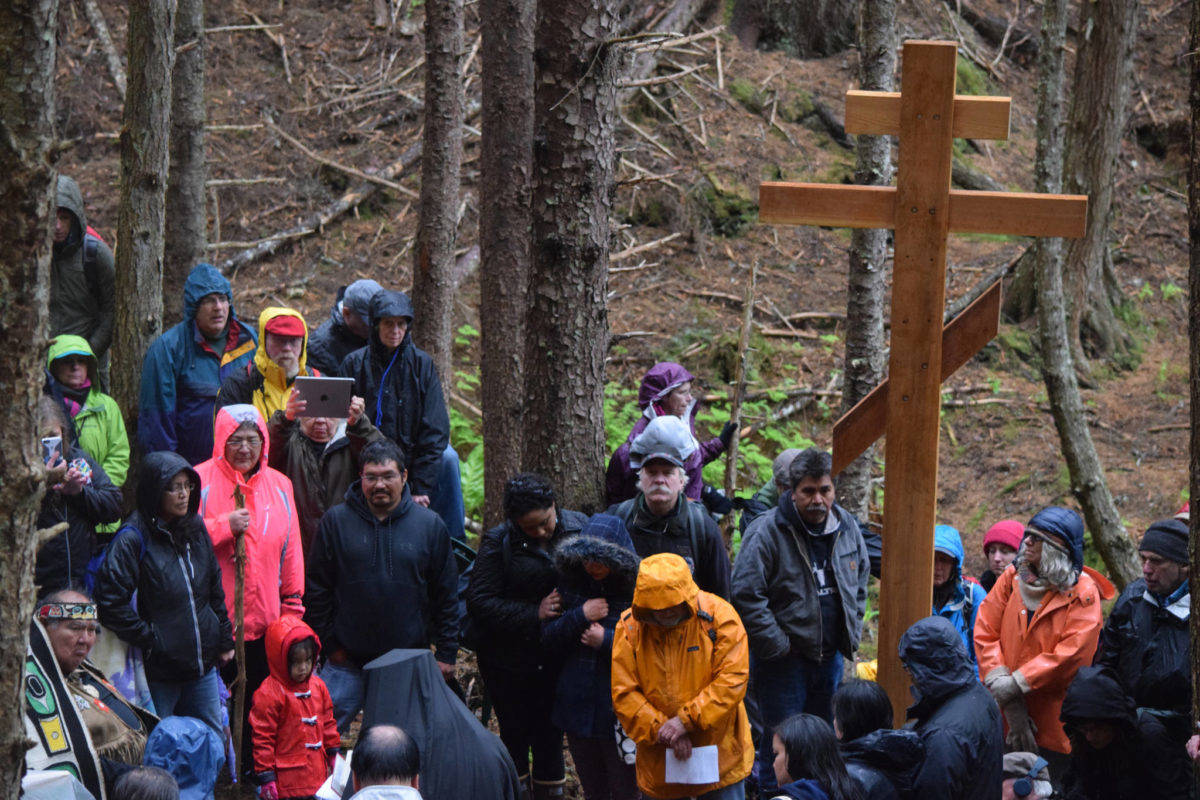Most of us learn at an early age that cemeteries are the sacred places. There’s one on Admiralty Island that may finally get the protection it deserves. If House Bill 122 is passed by the Senate and signed into law, 32 Unangax gravesites will be placed within the boundaries of Funter Bay Marine State Park.
In 1942, the U.S. government deemed it necessary to protect 480 Pribilof Islands residents from a possible Japanese invasion. They were forcibly removed and taken to Funter Bay. And for the duration of the war, they endured living conditions worse than enemy officers imprisoned at Excursion Inlet just 30 miles away.
“The Nazis, sworn enemies of the United States and allies, were treated far better than the Unangax because their conditions were guaranteed by international law,” Rep. Sara Hannan, D-Juneau, wrote in her statement sponsoring HB 122. “The 700 German prisoners all returned home after the war without a single one dying during their imprisonment.”
Tragically, the Unangax at Funter Bay had no such protection.
[Retracing the Wartorn Path to Funter Bay]
Martin Stepetin is the grandson of four who survived and returned to St. Paul.
“The value of protecting the social and historical significance of this land will cement the history for good,” he told lawmakers last May, “and we will never have to repeat this history again.”
What he’s referring to, of course, is the idea that we study history to avoid the mistakes of the past. It means bringing the darkest chapters into the light. Protecting the cemetery at Funter Bay will help accomplish that.
Cemeteries have been given a prominent place in our nation’s history since 1862. That’s when Congress authorized the purchase of land for final resting place of soldiers killed in the line of duty. Among them are historic Civil War battlegrounds such as Gettysburg and Antietam.
The American Battlefield Trust is a nonprofit dedicated to preserving those and other battlegrounds. Referring to them as “living memorials,” their goal is to pass on the soldiers’ acts of heroism and sacrifice to future generations of Americans.
But battlegrounds and cemeteries contain much more than stories of valor and courage. Many soldiers experienced intense suffering in their last minutes and hours. Like the one remembered by Walt Whitman in his poem The Wound Dresser:
“The neck of the cavalry-man with the bullet through and through I examine Hard the breathing rattles, quite glazed already the eye, yet life struggles hard (Come sweet death! be persuaded O beautiful death! In mercy come quickly.)”
Unfortunately, while such solemn verses might be studied in a literature class, they’ve been excluded from most high school history curricula.
As are the civilian casualties of war. Scouring the historical record, anywhere from 50,000 to more than a quarter million innocent people lost their lives during the Civil War. Like the Unangax who died while interned at Funter Bay, war’s history is incomplete without their stories.
“Our history – the good, the bad, the heroic, the regretful – shapes who we are as Americans today,” the American Battlefield Trust tells us. “That history can serve as a powerful lesson and inspiration, but only if it can be preserved.”
These stories suggest the chorus to the song Down by the Riverside that’s often sung at anti-war rallies – “I ain’t gonna study war no more” — isn’t consistent with the value of preserving these cemeteries. To understand what war really is, we need to study it more completely.
Think about America’s civil rights history. We can’t celebrate the 13th, 14th, and 15th Amendments to the Constitution unless we acknowledge the moral bankruptcy of slavery. We must learn about the scourge of Jim Crow laws that followed emancipation to appreciate the heroic work of Martin Luther King Jr.
And we need to know the full story of racial discrimination in Alaska to understand why the U.S. released a commemorative coin honoring Elizabeth Peratrovich.
This year marks the 75th anniversary of Peratrovich’s speech to the territorial legislature that facilitated passage of Alaska’s Anti-Discrimination Act. It came too late for Unangax who perished at Funter Bay. But in the spirit of equal rights, and out of respect for their children and grandchildren, it’s time to properly protect the grounds where their souls were put to rest.
• Rich Moniak is a Juneau resident and retired civil engineer with more than 25 years of experience working in the public sector. Columns, My Turns and Letters to the Editor represent the view of the author, not the view of the Juneau Empire.

